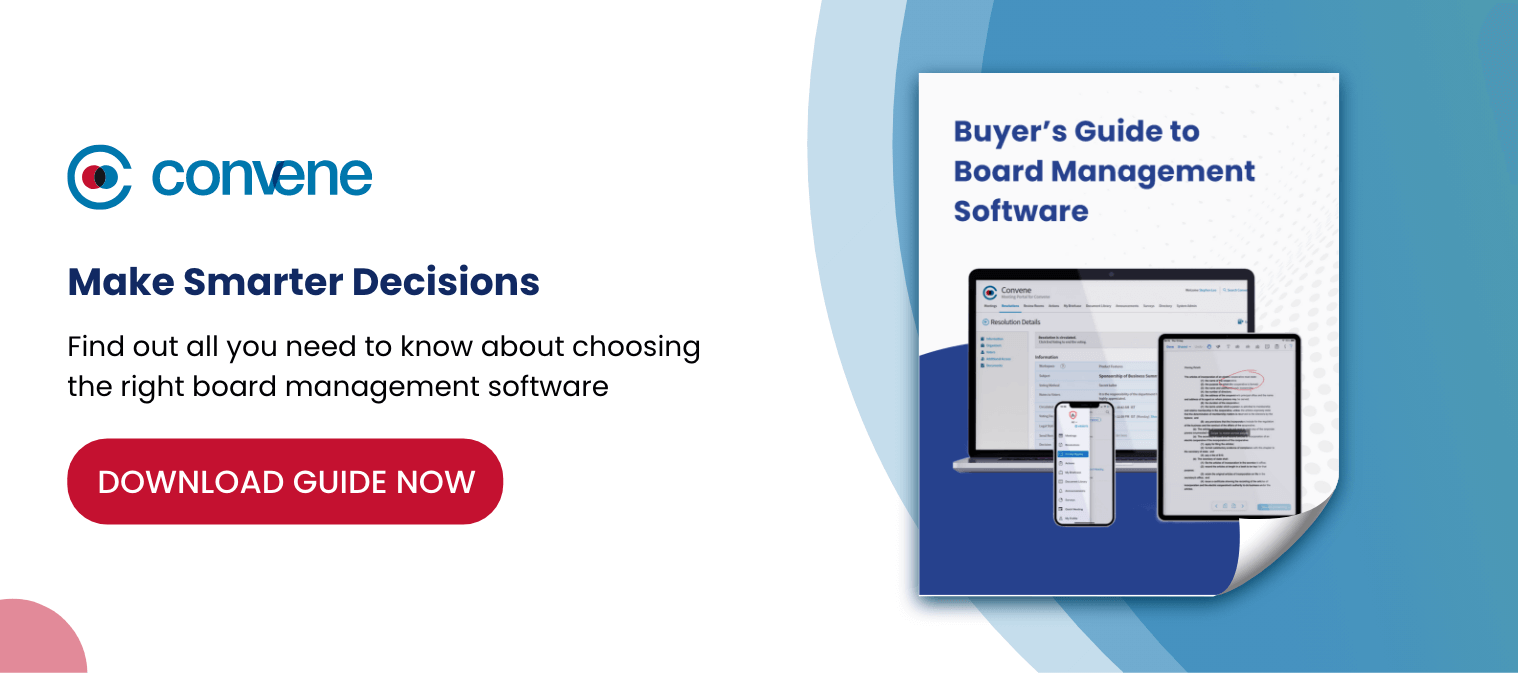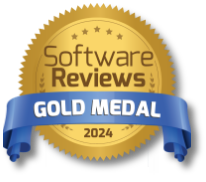Driven by local economic pressures and a heightened focus on transparency, boardrooms in South Africa are undergoing a tremendous transformation. And much like boards in other parts of the globe, the demand for efficiency and value creation transpires. South African boards find it difficult to streamline their operations — often bogged down by outdated procedures, lengthy meetings, and complex governance frameworks. On the value-creation front, many are struggling to align strategic objectives with stakeholder expectations.
Board effectiveness is increasingly under scrutiny, with stakeholders expecting more active engagement from directions. Such rise of shareholder activism, particularly in large publicly listed companies, is adding pressure on boards to align their actions with long-term value creation. Digital transformation became the perfect tool to tackle such board challenges. In particular, governance tools such as board software can reduce administrative burdens, increase engagement, and create value in meaningful ways.
Continue reading to find out how exactly board software can benefit South African organisations and their boards.
The Importance of Board Software in South African Organisations
In a landscape where engagement and productivity are critical, board software acts as the perfect tool for South African organisations to keep pace. Find out below how these platforms can be beneficial.
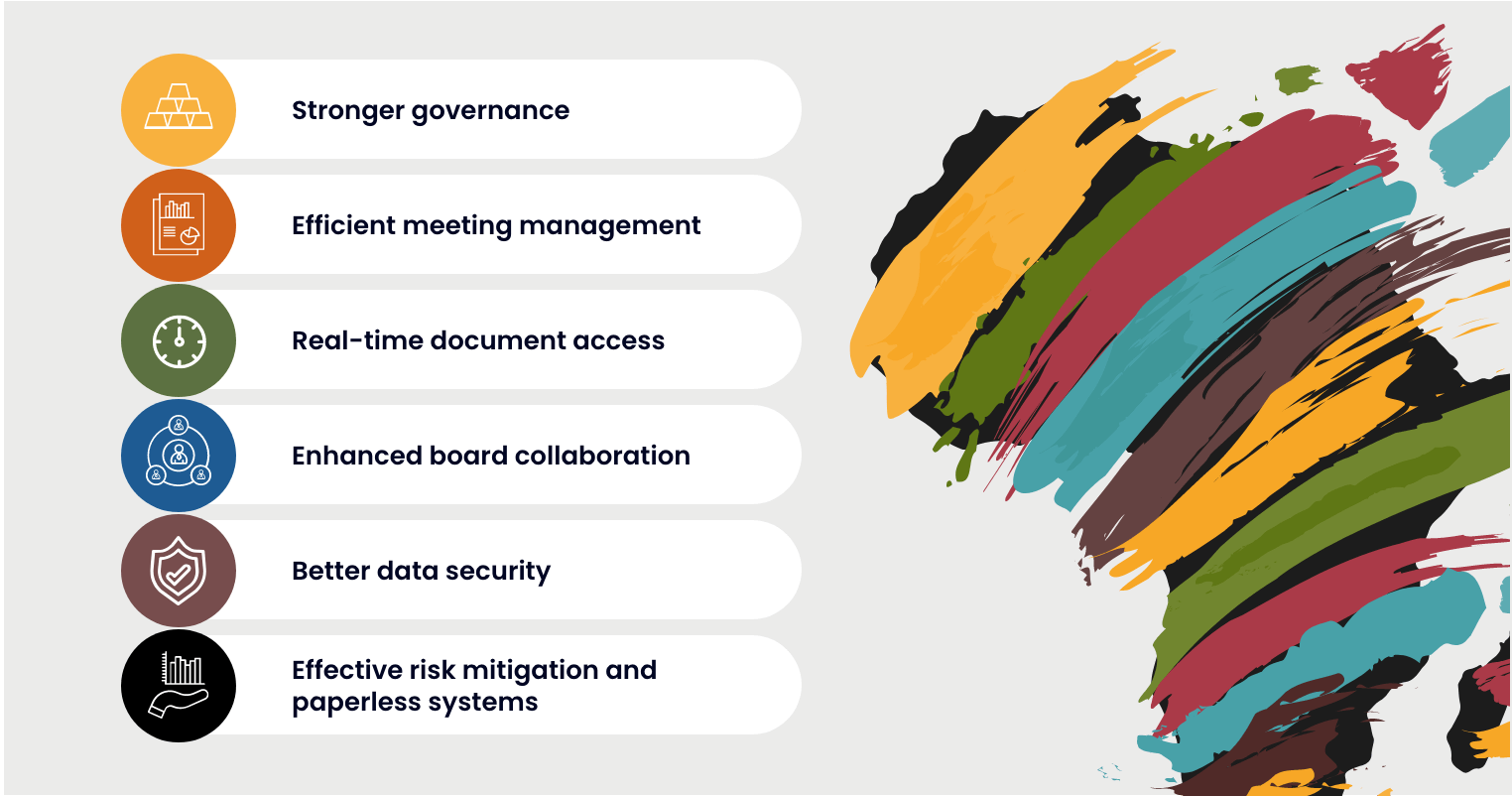
Stronger governance
Governance in South Africa is shaped by the King IV Report, which emphasises ethical leadership, accountability, and transparency. Board software supports such principles with an organised and compliant platform for board operations. With this, directors can easily access relevant governance documents, track their decision-making processes, and monitor compliance with regulatory requirements. Hence, boards can also align their company policies or procedures with governance best practices. Moreover, using board software improves a board’s ability to make well-informed decisions that positively impact the strategic direction of their organisations.
Efficient meeting management
Board software is known for its ability to manage meetings more efficiently. South African boards, which often struggle with time constraints and lengthy agendas, can streamline their entire meeting process using such platforms. From scheduling and agenda-setting to recording minutes and tracking action items, the right board software can automate key meeting aspects.
Additionally, directors can easily access board materials before meeting, therefore, reducing preparation time and ensuring they’re fully informed. This then results in more focused meeting discussions and quicker decision-making. Some board software also offers tools such as e-signatures and voting, which allow for faster approvals and resolutions—even between meetings.
Real-time document access
Being able to access and update documents in real-time is one of the critical activities boards constantly need. With the use of board software, directors can have immediate access to the latest versions of board documents, including financial reports, strategy papers, and legal agreements. Such features are especially critical in fast-moving industries where decisions should be made based on the current data.
In South Africa, where boards must respond to a rapidly changing economic and regulatory environment, real-time access ensures directions never work with outdated information. Plus, this enables quicker updates and distribution of board materials, eliminating the need for back-and-forth email exchanges or risks of errors.
Enhanced board collaboration
Effective collaboration is vital for boards to function optimally, especially in a geographically diverse country like South Africa. Board software can make this happen by enabling virtual meetings, secure messaging, and real-time discussions among directors. Directors, who may not always be in the same location, can engage in ongoing dialogue, share insights, and collaborate with the need to meet physically. As South African organisations increasingly adopt hybrid work models, board software ensures that collaboration remains seamless, irrespective of location.
Better data security
Given the sensitive nature of board materials, data security is a critical concern for organisations in South Africa. Just last June, the National Health Laboratory Service (NHLS), a government-operated diagnostic pathology service in South Africa, suffered from a ransomware attack that deleted its backups and caused delays in lab testing.
Board software offers robust board security features, including encryption, multi-factor authentication (MFA), and role-based access controls — all essential for protecting confidential data. This is especially imperative in South Africa’s regulatory environment, where compliance with data protection laws like the Protection of Personal Information Act (POPIA) is mandatory. Board software not only helps organisations comply with these regulations but also reduces the risk of data breaches, which often results in serious legal consequences.
Effective risk mitigation and paperless systems
South African boards are facing increasing risks, ranging from economic volatility to cybersecurity threats. Transitioning to paperless operations by using board software helps mitigate such risks. Therefore, reducing the chances of data loss and unauthorised access to sensitive information. Board software offers tools for electronic document management, secure communication, and digital compliance tracking. Furthermore, board software has audit trails for transparency and accountability, wherein all activities are documented and traceable.
Challenges of Using Board Software in South African Organisations
While board software offers significant benefits in streamlining governance and boosting productivity, some challenges in its utilisation can still be present without proper implementation and management. Here are some challenges in using modern technology like board software and how South African organisations can resolve them.
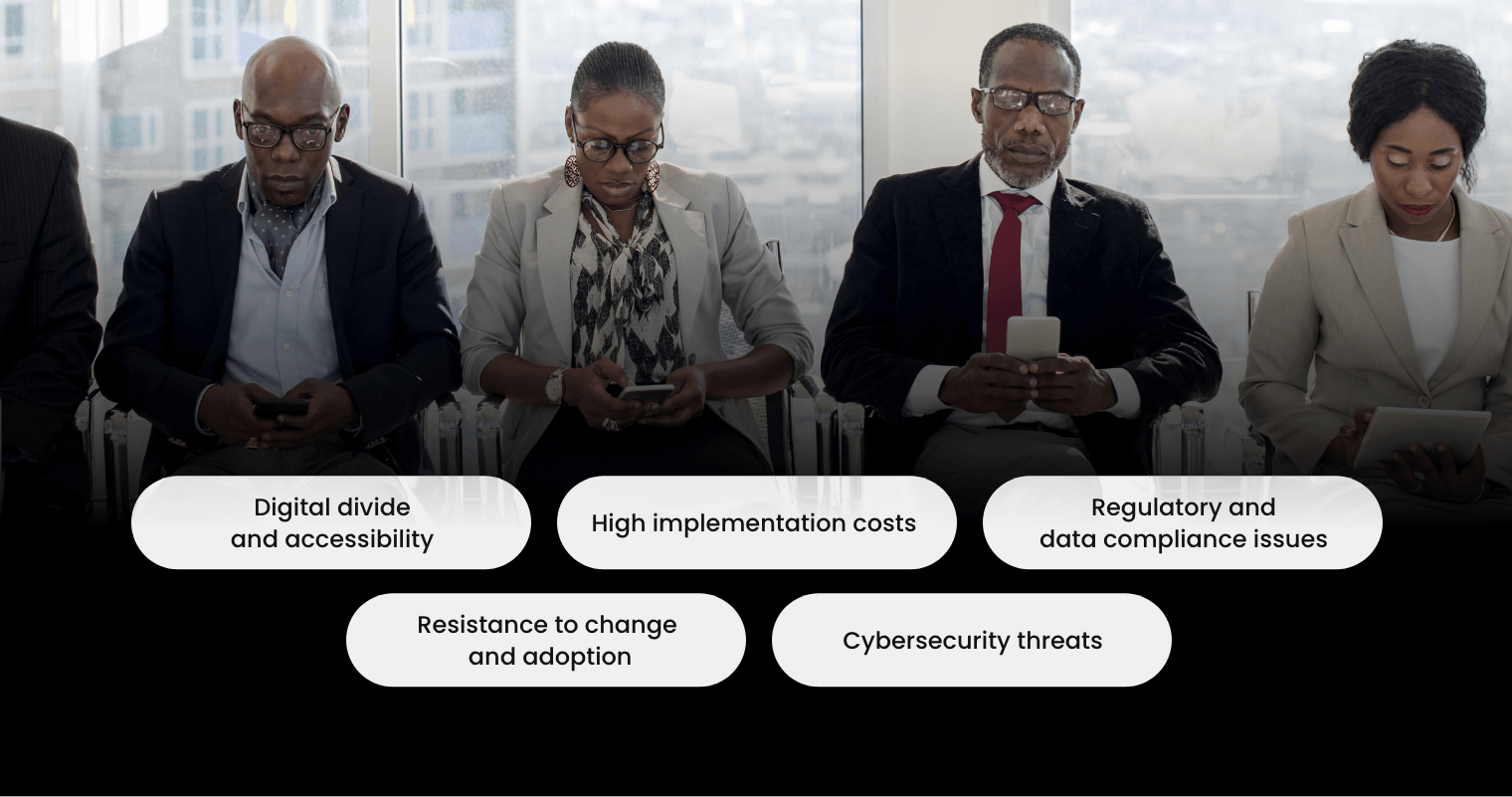
1. Digital divide and accessibility
One challenge that South African organisations face when using board software is the digital divide, particularly between urban and rural areas. In 2023, smartphone users in South Africa witnessed 14.4% slower download speed experience and 29.2% slower upload speed experience in rural areas than in urban locations. The rural-urban digital diver limits the effectiveness of remote access to board materials and virtual meetings.
Moreover, there are board members who may not be digitally literate and will struggle to adapt to new technology like board software. Therefore, reducing their ability to fully participate in decision-making processes.
What to do? Investing in low-bandwidth versions of board software can bridge the digital divide. Look for one designed to function even with a slow or unstable internet connection. It’s also ideal to provide directors with digital literacy training to help them become comfortable with technology.
2. High implementation costs
In some cases, the upfront costs of implementing board software can be a barrier, especially for not-for-profits and SMEs. Many South African organisations operate within tight budgets, making the acquisition of advanced board management tools less of a priority compared to other pressing needs. Plus, ongoing costs should be considered such as subscriptions, system maintenance, and user training.
What to do? Explore scalable board software options, such as those offering tiered pricing or pay-per-user models — ideal for smaller companies to start with basic features and expand as needed. In addition, leveraging trial periods can help in managing initial costs. Don’t forget to also calculate the long-term ROI of board software, to ensure you get significant cost- and time savings.
3. Regulatory and data compliance issues
South African organisations must comply with the POPIA, which governs the use, storage, and protection of personal data. Board software, which often stores sensitive governance and financial documents, needs to meet strict compliance standards. Availing of software that is not aligned with both local and global regulations can pose non-compliance risks — resulting in legal issues and monetary penalties.
What to do? It is always ideal to choose a platform that complies with POPIA and other relevant global regulations. It is also essential to work with software providers that prioritise local legal requirements and are designed with data encryption, secure storage, and data residency options (i.e. hosting data within South Africa). Regular audits and legal consultations on software can also ensure ongoing compliance.
4. Resistance to change and adoption
Resistance to change among board members can hinder the successful implementation of the board software. Many board directors, particularly those with decades of experience, are often accustomed to traditional board practices (e.g. paper-based systems, in-person meetings). The reluctance to adopt new technology can slow down the software’s onboarding and decrease its overall effectiveness.
What to do? Education is always the first step to successful change management. Workshops or one-on-one training sessions can help board members understand the benefits of using the software. A phased rollout approach can reduce resistance—starting with less complex features then gradually introducing more advanced tools. In addition, choosing an intuitive platform with a user-friendly interface can ensure a seamless transition. Hence, also simplifying the learning curve and fostering faster adoption.
5. Cybersecurity threats
The risk of cyberattacks continues to increase not just in South Africa, but in other parts of the globe too. Cybersecurity incidents such as data breaches, unauthorised access, and phishing attacks can compromise confidential board materials. Many organisations, particularly smaller ones, often opt for cheaper board software with inadequate security measures.
What to do? Invest in board software with strong built-in security features, such as end-to-end encryption, MFA, and secure cloud storage. On top of that, it’s recommended to also conduct regular cybersecurity audits, provide training on cyber hygiene, and develop an incident response plan.
Key Features in Board Software that Organisations Should Look For
As organisations in South Africa increasingly rely on digital tools to enhance board operations, picking the right board software is highly critical. Below are key features organisations must prioritise when choosing board software.
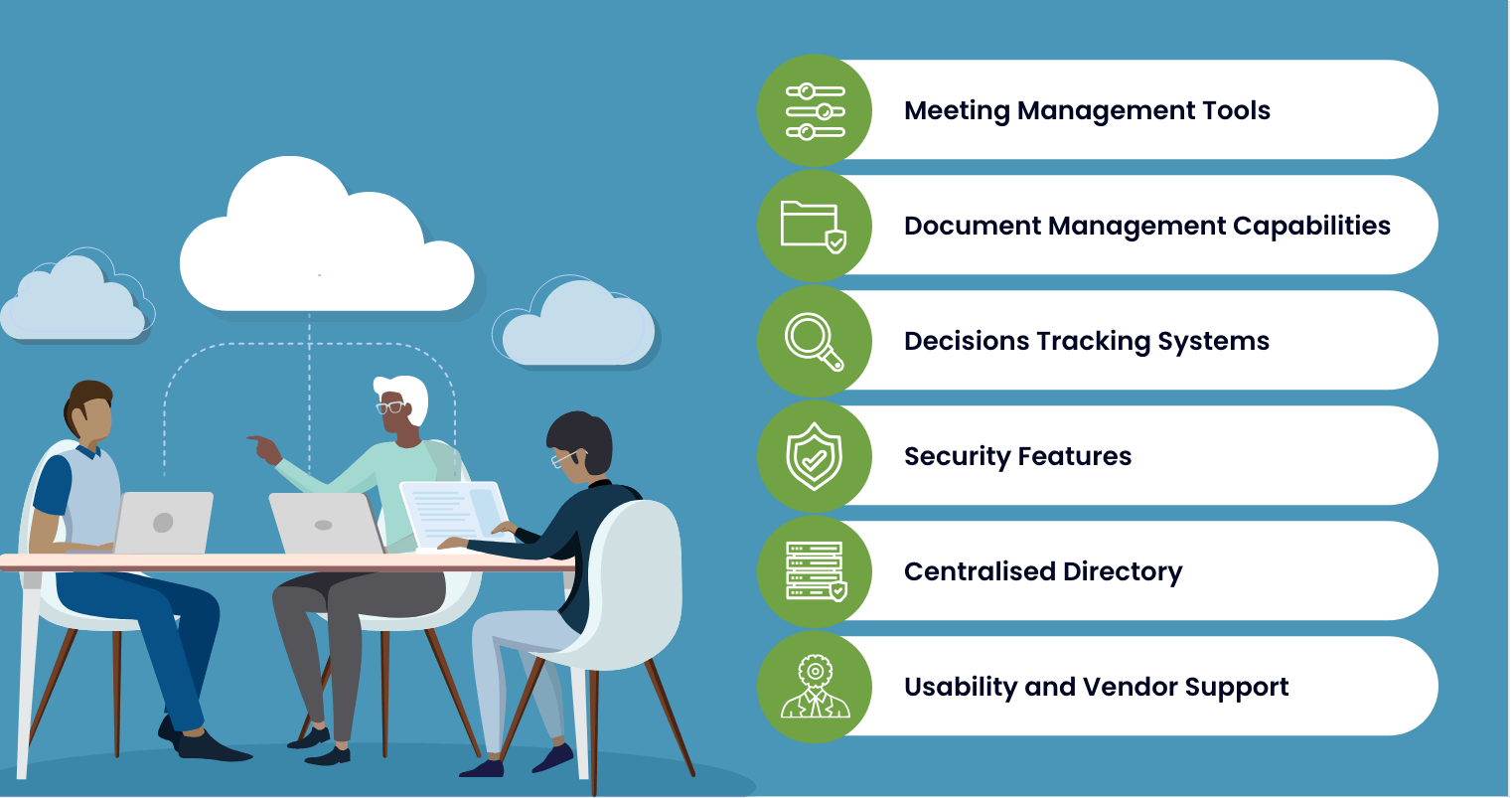
Meeting Management Tools
One of the features that organisations need in board software is its ability to manage meetings efficiently. Look for one that offers tools to schedule board meetings, send automated reminders, and distribute agendas in advance. It is also ideal if the platform can allow directors to RSVP, access meeting materials in real-time, and participate in virtual or hybrid discussions. To streamline the meeting process, opt for software with features like minute-taking and assigning action items. Hence, ensuring follow-ups are clear and trackable.
Document Management Capabilities
Document management capabilities are another key feature organisations should look for in board software. It should allow directors to access, share, and collaborate on critical board files. Search for a platform that offers a centralised repository for strong governance documents such as financial reports, strategic plans, and legal documents.
To keep everyone updated on the latest files, board software features such as version control, real-time document updates, and file annotations must be present. Document access controls are equally important in ensuring only authorised users can view or edit sensitive data.
Decisions Tracking Systems
These features ensure that board resolutions and voting processes are streamlined and easily traceable. The board software should be able to facilitate electronic voting and decision-making between or during meetings. Being able to conduct secure and auditable voting processes is imperative for accountability and transparency. Look for board software that can track votes, approvals, and decisions, allowing directors to monitor the results of each vote or resolution.
Security Features
Given the sensitive nature of board discussions and documents, board security is a top priority when looking for board software. It should be equipped with industry-leading security features such as end-to-end encryption, MFA, and secure document storage.
At the same time, it must comply with local data protection regulations, such as South Africa’s POPIA — ensuring that confidential board data is protected against unauthorised access or data breaches. Role-based access controls are also essential to limit access to board materials only to those who need them. Lastly, regular software updates and vulnerability testing must be part of the board security protocol to guarantee ongoing protection.
Centralised Directory
Another key board software feature to look for is a centralised directory for smooth board communication and collaboration. Organisations must opt for a platform designed with a comprehensive directory of board members, executives, and key stakeholders. Such features can be utilised for easy access to contact information, bios, and organisational roles. The directory can serve as a resource for sharing background materials, such as director profiles, which can be helpful for new members during onboarding or when forming committees.
Usability and Vendor Support
Last but not least, the usability of board software is another feature significant for ensuring adoption and continued use by directors. A user-friendly interface that’s intuitive and easy to navigate will reduce the learning curve, particularly for members who may not be tech-savvy. It’s also ideal that the platform provides a seamless experience across multiple devices (e.g desktops, smartphones, tablets) and operating systems.
Moreover, board software features such as drag-and-drop document uploads, customisable dashboards, and mobile access improve usability. Consider also if the board software comes with comprehensive customer support, including tutorials, training resources, and live assistance — ensuring all users can learn and maximise the software’s capabilities.
Boost Board Engagement and Productivity with Convene

South African boards often face challenges in managing the full scope of board activities, particularly when relying on manual processes. From coordinating meetings to handling documents and tracking decisions, the administrative burden can be overwhelming. Manually managing such tasks not only slows down decision-making but also increases the risks of errors and compliance issues. This is why many boards are turning to digital solutions like board software.
One of the leading solutions in this space is Convene, an award-winning board software designed to elevate board operations. Convene empowers South African organisations with a suite of advanced features aimed at improving board engagement and productivity.
Telekom Networks Malawi (TNM), a leading mobile telecommunications provider in the region, has this to say about Convene, “Convene’s intuitive nature and capabilities help us to manage board activities electronically. Convene is a good investment for every company.”
Pan African Reinsurer WAICA Re Zimbabwe (Pvt) Limited also shared how Convene streamlined their meeting processes, “We have had a great experience with Convene. No issues with sending bulky board papers to board members. Meetings have become better organised.”
To learn more about Convene and its other features, request a demo from our team today!
Jielynne is a Content Marketing Writer at Convene. With over six years of professional writing experience, she has worked with several SEO and digital marketing agencies, both local and international. She strives in crafting clear marketing copies and creative content for various platforms of Convene, such as the website and social media. Jielynne displays a decided lack of knowledge about football and calculus, but proudly aces in literary arts and corporate governance.


